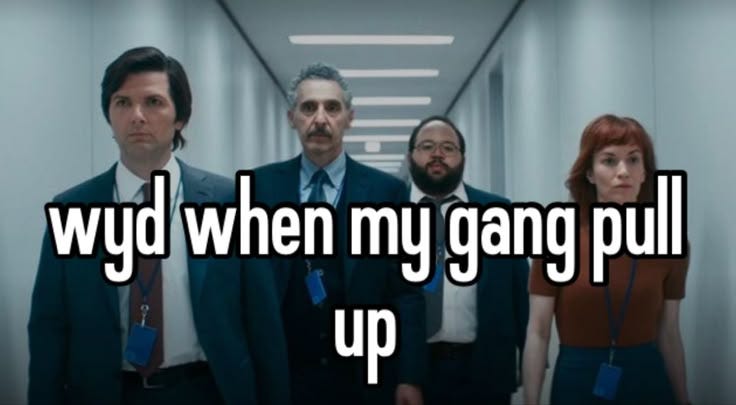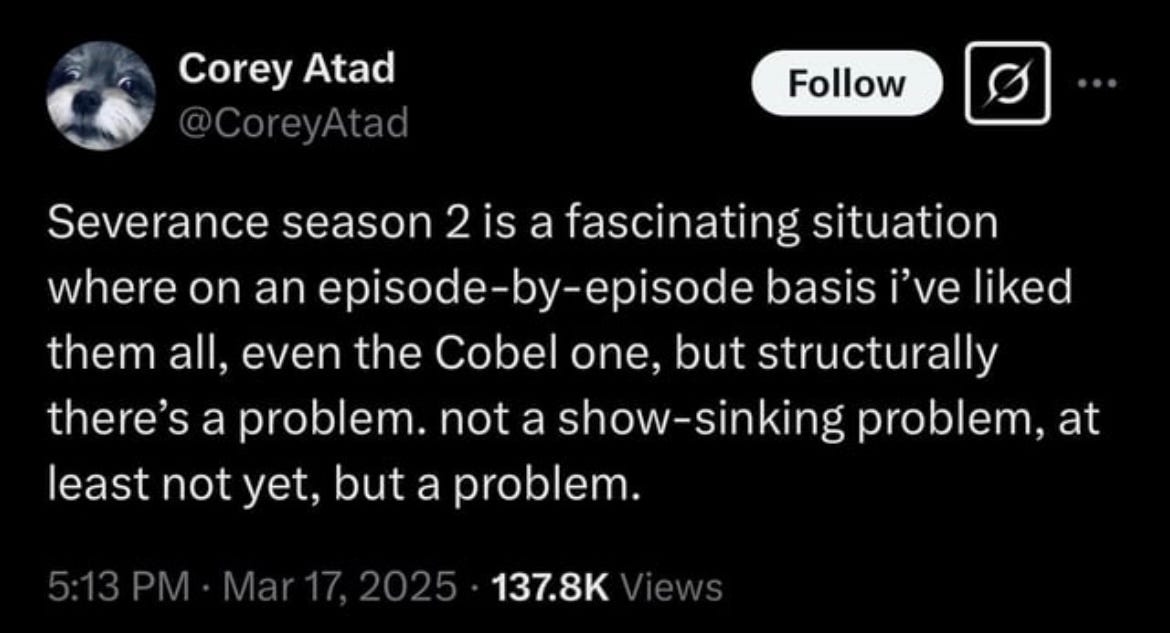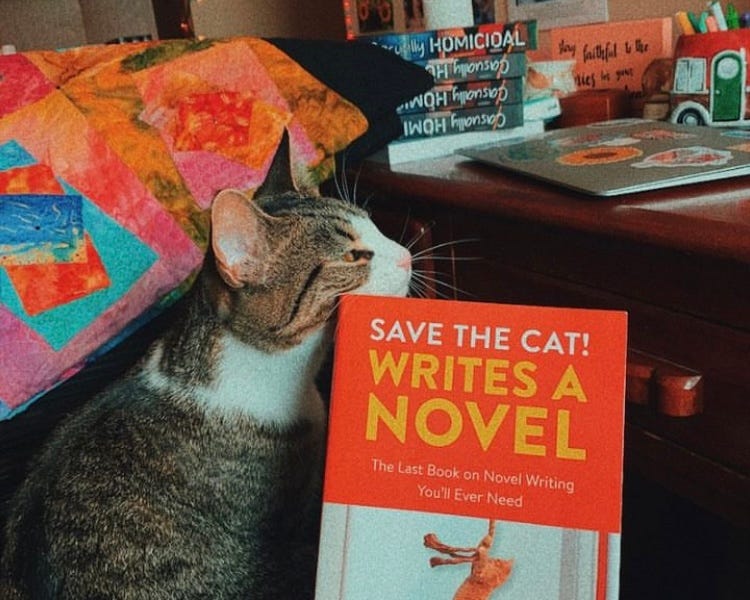Storygasms: The Anatomy of Consistent, Earned Catharsis
Analysis of Season Two of Severance and Lost
(Spoilers, duh.)
If I had a nickel for every time a second season of television came out in the past year was visually stunning and masterfully produced, but incredibly poorly written, paced, plotted, I’d have two nickels, which isn’t a lot but I’M SO MAD IT HAPPENED TWICE.
Looking at you, Arcane and Severance. If this happens again, I swear I’m giving up on watching shows that are currently coming out. Completed stuff only from now on.
Either way, I’m going to attempt to be a bit more academically-oriented in this one. Citing my sources and such. It’s good practice since I believe this work is important. Opinions are like assholes; everybody’s got one. But being able to construct a logical argument by drawing upon multiple sources and critical thought? That’s a skill we all must continue to sharpen.
Obligatory Context
Apple TV’s Severance is a show I’ve been trying to get people to watch since 2022. A science fiction psychological thriller, the show centers around a group of office workers who have had their personal and work life memories “severed”. While at home, they have no idea what they do at work. While at work, they have no idea who they are outside of work. The show centers around a man named Mark (Adam Scott) who undergoes severance to cope with the grief of losing his wife. Some important terminology to know is that while at work, Mark and the other severed workers are referred to as “innies” and their personal lives outside of work referred to as “outies”.
Severance is Lost (2004-2010) meets Office Space (1999)
Season 1 was, in my opinion, a masterpiece—and that’s not an unpopular opinion. According to Wikipedia, Severance “received acclaim for its cinematography, direction, production design, musical score, story, and performances.” It also was nominated for 14 Emmy Awards. I think it deserves all this and more.
So naturally, my friends and I were extremely excited for Season 2. Some of us had watched it more recently, and some of us (me) had been waiting for almost three damn years. But after the beautiful disappointment that Arcane Season 2 was, I still trusted the creators and writers of Severance to do it better. To not disappoint.
I’m still determining the exact degree of how disappointed I am, but what I can say is that Severance Season 2 has some major writing problems that weren’t present in Season 1. For now, I’ll just focus on one that I feel I can articulate with the most clarity: catharsis.
The Boring Definitions Part
Here’s when I pull out my English degree chops. Originating in Aristotle’s Poetics, “catharsis” is a term from Ancient Greek theater. According to Woodhead Publishing, catharsis is “a literary device used to simulate a release of emotions. Catharsis can be applied to any type of art or media that makes audiences feel intense emotions such as pain or sadness, but ultimately leads to a feeling of release. The audience feels [after catharsis] that they have been able to release some of their own sadness, anxieties, or fears along with what they felt as a result of the story.”
I like to be a little crude about it and like to think of catharsis as the narrative equivalent of an orgasm. A storygasm. You heard it here first, folks.
This means that one of the many social purposes of story and narrative is to make its audience feel a range of emotions—but not just feel them, but to release them. Story is all about tension: Will our ragtag band of middle schoolers solve the who-done-it? Will Laura and Allison get together in the end? Will the aliens of the planet Ya’hura free themselves from the shackles of the Intergalactic Empire? As good audience members, we want to know—and it feels damn good to not only know, but find out.
Additionally, there’s also a sense of entitlement wrapped up within catharsis. If I’m a Greek citizen and I’m going to spend my Saturday evening at the theater instead of, I don’t know, doing something more productive like pressing more olives for oil or weaving a new floor mat, then I want that time to be well-spent. I want to feel like I’ve gotten something out of that experience, whether that was a good cry or a renewed sense of resolve in the power of love or a deeper understanding of the political climate through allegory. I don’t want to leave feeling empty, disappointed, confused.
One of the worst things a story can be is a waste of time.
Lost: Consistency in Catharsis
What makes Season 2 of Lost so good is that it both raises more complex questions and gives satisfying answers—a precarious balance of intrigue and catharsis. The same cannot be said of Severance's second season. Let's break it down why specifically Lost is so consistent when delivering character- and plot-relevant catharsis.
Despite qualms people had with Lost’s eventual ending, Lost did in fact give its audience answers. Lost Season 1 ends with the gang—Jack, Locke, Kate, and Hurley—blowing open the Hatch door so that the survivors can hopefully hide from the Others inside (1.24). Lost's Season 2 opens with a 3 episode arc about what exactly is inside that Hatch (2.1-3). Even though fans had to wait a year for Season 2 to come out, that’s still pretty immediate and satisfying catharsis.
Additionally, we learn who’s inside the Hatch (Desmond) and what it actually is (the Swan Station). We eventually learn what the Swan Station does (releases latent electromagnetic pressure). We learn why it's significant to the overall plot (Desmond's negligence led to a build-up of that pressure, indirectly causing Oceanic 815 to crash). We learn about the Dharma Initiative, which in and of itself both answers and raises more questions. We get answers to the question: "are there actually other people on the Island?" Yes, we meet "Henry Gale"—Benjamin Linus, the leader of the Others.
We finally see the Black Smoke in 2.10 “The 23rd Psalm”, and this episode functions both as character catharsis (Mr. Eko coming to terms with his role in his brother’s death) and plot catharsis (a good, solid look at what the Black Smoke actually looks like, and a hint at what it can do).
All of these examples above are character- and plot-relevant progressions that are peppered throughout the season’s 24 episode runtime.
But Severance Season 2 feels as though it lacks many of these cathartic plot moments, both at the end and peppered throughout. I can only pick out a few off the top of my head that feel as though they carry real narrative weight: Irving forcing Milchick to stop Helena Eagan from posing as Helly R. (2.4), learning that Harmony Cobel is the creator of Severance (2.8), and the eventual “freedom” of Gemma Scout (2.10).
In the video “Why Naruto Feels So Damn Good to Watch” by Kateri, he says:
“Catharsis is easier to achieve in a movie format than in, say, a show format, where there’s a significantly longer narrative. In a movie, that catharsis only needs to be achieved once. In a show, however, catharsis needs to be continuously achieved, or else the emotional core of the narrative will begin to fall apart.” (4:15-4:44)
If I'm going to sit down and give any story both my time and emotional energy, I feel as though this story owes me some payoff—and the longer the story, the more payoff the audience expects. That's what keeps any audience coming back to any story: the promise of that orgasmic catharsis. The promise that I, as a writer myself, am not wasting your time. The promise of a satisfying conclusion, whatever "satisfying" might mean in the context of each individual story.
That Ending—Cathartic, or No?
I will concede that the Gemma breakout plot—the last half hour or so of Episode 10—was finally that catharsis I was looking for. Mark and Gemma’s reunion was amazing—but it did come at the cost of concrete answers about Lumon and the severance procedure.
And before you ask—I get the ending. I get why innie Mark made the choices he did. I get why the writers made that choice and how it serves the narrative and its themes. That’s not necessarily what this post is about. I expect season finales to end on cliffhangers; Lost did it all the time. My problem, as stated above, is the lack of consistent and earned catharsis.
I kept watching episode after episode and wondering to myself: what actually happened? How are we any closer to completing our story goals? The episodes were engaging, thoughtfully crafted, and interesting, but lacking any sense of urgency or clear plot through-line. My suspect is that this is due to the crop of new directors and writers. I’m not necessarily faulting them, but the episodes felt disjointed in a way. User @CoreyAtad agrees with me:
The show gives us catharsis, but not enough of it over its runtime—which is when I’m gonna drop the famous Paul Hollywood from The Great British Bake-Off criticism: they have chosen style over substance. The balance is not balancing. The music, cinematography, and acting goes hard, but these things do not make a story; they enhance it. More from Kateri:
“These moments of catharsis, when properly earned, are the highest points of a narrative, and the best narratives continuously achieve this peak of catharsis.” (4:01-4:12)
Now, I’m not going to Narutopost again and make this all about Naruto, but what Kateri says here applies well to Severance Season 2: “when properly earned”.
Does the decision Mark make at the end of Season 2 make sense? Yes. Does it fit with the themes and goals of the story? Also yes.
Has it been emotionally earned by the focus of the narrative? Nope.
Earning Catharsis
But how do you earn catharsis? And why were so many audience members shocked by Mark S.’s decision to stay inside Lumon with Helly R.?
Again, I get it, bro. Innie Mark (furthermore addressed as iMark, and outie Mark as oMark) chooses Lumon because that’s all he’s ever known. He chooses Helly R. because he loves her. Unfortunately oMark and Gemma’s love has not transcended Severance. As of this moment, the narrative tells us that Mark’s reintegration has failed. According to Reddit user @TheHangedKing on a post from the Severance subreddit:
@TheHangedKing here is referencing the end of 2.3 “Who is Alive?” and Episode 6 “Attila” and 7 “Chiaki Bardo.” During these episodes, Mark works with Reghabi to reintegrate. These moments when Mark is reintegrating are the best content from Season 2, because that’s what’s been promised to us, right? A reunification of these fractured holes. Justice for the innies, wholeness for the outies.
“Pump-faked” is when a sports player feigns a pass or shoot. It’s like when Lucy continually pulls the football out of Charlie Brown’s reach. In my experience there’s nothing more that an audience hates than being duped. It’s a cheap writing trick, and I hate it. It makes me feel like I’m wasting my time. And it’s not how you earn catharsis, because catharsis must be properly built up. Properly earned.
The emotional payoff I was really looking forward to with Season 2 was Mark Scout’s reintegration, and we honestly get blue-balled with this. At the end of Episode 3, Mark begins to reintegrate—yay! And then . . . nothing comes of it. The next episode they go on their wilderness retreat, an episode that doesn't focus on Mark's outie at all. The only indication in Episode 4 that we get is when Helena Eagan is sexually assaulting Mark's innie (yes, that was sexual assault), he hallucinates Gemma for a second or two.
It's discouraging because there's all this build-up: Mark reaching this breaking point, consulting Reghabi, the amazing sequence at the end of Episode 3—and then the narrative just sort of . . . moves on? Given what happened with Petey in Season 1, I expected Mark's reintegration to be different and more of a central focus of Season 2. I expected it to be addressed by the narrative with a bit more immediacy.
Despite two solid attempts, Mark does not reintegrate. Why? We don’t really know. Of what little I know about the scientific study of memory—particularly degenerative conditions like Alzheimer’s and dementia—I would assume that the memories that would be reintegrated first would be iMark’s and oMark’s earliest and most core memories. This does happen at the end of Episode 3 where a reintegrated Mark wakes up on the conference room table, but as logic follows, iMark should be remembering some of the earliest and most impactful moments of oMark’s life—meaning that iMark should start to remember his parents first, then his sister Devon, perhaps a childhood best friend, and eventually his wife, Gemma.
Even upon later reflection, I just can’t understand why Mark doesn’t reintegrate in any meaningful way, especially when the narrative keeps baiting-and-switching us with it. What does he remember? What doesn’t he remember? Why? Only God knows. The narrative promises us Mark’s reintegration twice, and we never get it.
If the narrative focuses on Mark’s reintegration process as it does in Episodes 2, 3, 6, and 7 then logic follows that this reintegration is what will eventually happen. Logic follows that this turning point decision will be related to the “climax” of the season—OOHHH that’s why they call it—
I digress. Ultimately, it doesn't feel like there are meaningful consequences to the plot developments that do happen. Irving’s outie connects with Burt’s outie (2.6)—and then Burt (or perhaps Lumon) forces Irving to leave town (2.9). Helena confronts Mark’s outie in a Chinese restaurant and they have a weird conversation after their innies had consensual sex (2.6). Time and time again, Mark attempts to reintegrate (2.3 and 2.6) and it’s barely addressed in any plot-impacting way. Milchick fucks up (2.2, 2.4, and 2.5) and mouths off to Mr. Drummond and he just continues to be Floor Manager.
I understand the concept of writers needing to both open new plot threads and tie up old loose ones, but I’d say that Season 2 is a good place to start tying up some old loose ends.
Conclusion
Do I think Severance is as bad of a second season as Arcane’s was? No, not in the slightest. I don’t think Severance takes a piss on its first season, which is what Arcane’s second season does. Read more about that below.
I just think that Severance Season 2 is a little too plot-twisty, a little too flashy, a little too drunk on its own mystery, that it’s forgotten to deliver the goods to its audience. It seems more interested in aesthetic, lore, and plot twists than it does in actually developing its characters and plot. It has forgotten to include us in on the adventure, more concerned with shocking us and provoking fan theories. I finished Season 2, Episode 10 “Cold Harbor” and felt empty, disappointed. I feel like that’s not how I’m supposed to feel. That’s not how I want to feel.
Now, I’m sure other people felt differently; that’s the cool thing about literature—everyone has different perspectives. Divisive media can be powerful in starting meaningful conversations. But hey, I’ve said my piece, and I’ve cited my sources.
Modern television, you’re on thin fucking ice.










